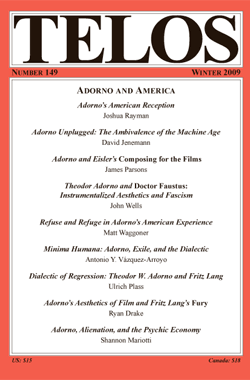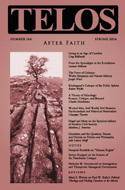As an occasional feature on TELOSscope, we highlight a past Telos article whose critical insights continue to illuminate our thinking and challenge our assumptions. Today, Lillian Hingley looks at Shannon Mariotti’s “Damaged Life as Exuberant Vitality in America: Adorno, Alienation, and the Psychic Economy” from Telos 149 (Winter 2009).
 In her article “Damaged Life as Exuberant Vitality in America: Adorno, Alienation, and the Psychic Economy,” from Telos 149 (Winter 2009), Shannon Mariotti claims that Adorno’s Minima Moralia ultimately rejects psychoanalysis for reinforcing the reification that it was supposed to resist. She argues that Adorno is particularly concerned with an American psychodynamic therapy that empties psychoanalysis of its European “pessimism” and that instead seeks “happiness” rather than a mere “cure.” While some points in Mariotti’s argument and a more critical psychoanalysis are not incompatible, her cautious application of Adorno’s critique of psychoanalysis to a contemporary context suggests that Minima Moralia might provide a useful framework for interpreting modern American pharmaceutical psychology. In turn, this brief analysis adds context to Mariotti’s grant of practical space to mental illness in therapy rather than seeing it as something to be merely glossed over. Indeed, she gives today’s readers a blueprint for carefully applying Adorno’s thinking to contemporary American therapeutic practices.
In her article “Damaged Life as Exuberant Vitality in America: Adorno, Alienation, and the Psychic Economy,” from Telos 149 (Winter 2009), Shannon Mariotti claims that Adorno’s Minima Moralia ultimately rejects psychoanalysis for reinforcing the reification that it was supposed to resist. She argues that Adorno is particularly concerned with an American psychodynamic therapy that empties psychoanalysis of its European “pessimism” and that instead seeks “happiness” rather than a mere “cure.” While some points in Mariotti’s argument and a more critical psychoanalysis are not incompatible, her cautious application of Adorno’s critique of psychoanalysis to a contemporary context suggests that Minima Moralia might provide a useful framework for interpreting modern American pharmaceutical psychology. In turn, this brief analysis adds context to Mariotti’s grant of practical space to mental illness in therapy rather than seeing it as something to be merely glossed over. Indeed, she gives today’s readers a blueprint for carefully applying Adorno’s thinking to contemporary American therapeutic practices.
 Slavoj Žižek and Terry Eagleton have recently deployed the neo-Lacanian appropriation of Kant’s notion of radical evil in favor of an emancipatory politics of terror. For Žižek, there is a “progressive” passion for the Real that is aimed at universal justice. Similarly, Eagleton insists that there is a “good” will to nothingness that, if embodied by the wretched of the earth—that is, the victims of global capitalism—can lead to a radical transformation of society. In this article, I argue that Žižek’s and Eagleton’s accounts of terror are problematic as long as they are based on the assumption that there is a fundamental ontological flaw in human will to which the most intractable horrors of history are to be traced down. Following Adorno, I contend that evil is a social category or, in Adornian terms, an expression of the oppressive totality of which individuals as such are not responsible, and that, in the rationalized society of late capitalism, evil individuals such as Iago and Richard III have become impossible.
Slavoj Žižek and Terry Eagleton have recently deployed the neo-Lacanian appropriation of Kant’s notion of radical evil in favor of an emancipatory politics of terror. For Žižek, there is a “progressive” passion for the Real that is aimed at universal justice. Similarly, Eagleton insists that there is a “good” will to nothingness that, if embodied by the wretched of the earth—that is, the victims of global capitalism—can lead to a radical transformation of society. In this article, I argue that Žižek’s and Eagleton’s accounts of terror are problematic as long as they are based on the assumption that there is a fundamental ontological flaw in human will to which the most intractable horrors of history are to be traced down. Following Adorno, I contend that evil is a social category or, in Adornian terms, an expression of the oppressive totality of which individuals as such are not responsible, and that, in the rationalized society of late capitalism, evil individuals such as Iago and Richard III have become impossible. 






